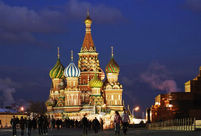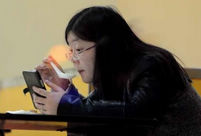 Li Na crashes Belinda Bencic in 2nd round at Australian Open
Li Na crashes Belinda Bencic in 2nd round at Australian Open
 Shocking moments when PLA's weapons open fire
Shocking moments when PLA's weapons open fire Famous Lanzhou beef noodles
Famous Lanzhou beef noodles Armed Police hold anti-terrorism drill in SE China's Xiamen
Armed Police hold anti-terrorism drill in SE China's Xiamen Harbin Int'l Ice and Snow Festival opens
Harbin Int'l Ice and Snow Festival opens 'Jin' named the word of the year by cross-strait netizens
'Jin' named the word of the year by cross-strait netizens Chinese scientific expedition goes to build new Antarctica station
Chinese scientific expedition goes to build new Antarctica station
 Chinese naval escort fleet conducts replenishment in Indian Ocean
Chinese naval escort fleet conducts replenishment in Indian Ocean 17th joint patrol of Mekong River to start
17th joint patrol of Mekong River to startChina's public transportation system will struggle to cope with this year's annual Spring Festival mass migration, an official said Tuesday.
The 40-day Spring Festival travel rush, known as chunyun, starts Thursday, and is expected to see 3.6 billion passenger journeys, an increase of 200 million from last year, authorities announced at a press conference on Tuesday.
Analysts said that the cause of the world's largest annual migration is the continuing economic imbalance between regions of China, especially the coast and the interior.
Lian Weiliang, a deputy head of the National Development and Reform Commission, acknowledged at the press conference that the current capacity of the system still could not fully meet the peak chunyun demand.
"Therefore it will still be difficult to get a ticket in some regions during the period," Lian said.
Among the various means of public transportation, the railway sector, which carried out structural reform last year, faces the most challenges and has faced a deluge of complaints over the difficulty of procuring a train ticket.
Hu Yadong, a vice general manager of the China Railway Corporation, told Tuesday's press conference that 258 million trips are estimated to be made by railway during chunyun, a 7.9 percent increase year on year.
Railway authorities have repeatedly vowed to put an end to the difficulties in getting train tickets during the travel peak, but have failed to meet the deadlines set to solve the problem.
In response to the chronic issue, Hu this time said there is "no timetable" to solve the problem. While highlighting the increase in the length of routes and passenger trains, Hu said the gap between demand and supply was also caused by the market and passengers' choice of the railways.
Economist Mao Yushi suggested raising ticket prices to curb demand, a practice piloted a decade ago but which only succeeded in attracting more complaints.
Lian Tuesday made it clear that the government wouldn't change the price mechanism during chunyun.
Ma Guangyuan, a Beijing-based economist, Tuesday told the Global Times that it is normal to see such pressure in a short period of peak passenger flow, otherwise, there would be serious overcapacity on the network in off-peak periods.
Many analysts have noted while efficiency needs improving, the reason such huge numbers are traveling at this time is due to an economic imbalance across the nation.
Zhao Jian, a professor at Beijing Jiaotong University, said to address the deep-rooted cause, it is critical to accelerate the urbanization drive and foster metropolitan clusters, in which urban areas spread out to the hinterland of larger cities.
"By relocating the migrants' families to small and medium cities or towns on the outskirts of large cities, this will largely ease the transport pressure," Zhao said.
However, much public frustration toward chunyun travel difficulties is because of China Railway's work style, said Ma.
Although the company has tried various means to aid passengers, including launching a mobile phone app for ticketing, a number of loopholes have been exposed, ranging from malfunctions of its ticket site to failures to stop online scalpers.
"Why can't it allow passengers to purchase tickets at other sites, as is the case with air tickets?" said Ma.
In addition to the railway sector, the decision to continue charging highway tolls on Chinese New Year's Eve, January 30, has also caused frustration. Most regions will allow toll-free journeys from midnight January 31 when the public holidays officially begin.
Northeast China's Heilongjiang Province, which initially won acclaim for waiving toll fees from January 30, has reversed its decision, after several regions reportedly expressed dissatisfaction over its move.
Some regions have argued that the toll-free practice would lead to inequality to taxpayers, as only a minority of car owners could benefit from it.
 In photos: Ten 'tuhao' devices in 2013
In photos: Ten 'tuhao' devices in 2013 College students saved from an ice hole by brave citizens
College students saved from an ice hole by brave citizens Gallery: Top 10 box office hits in 2013
Gallery: Top 10 box office hits in 2013 Beautiful churches around the world
Beautiful churches around the world Yang Mi, Hawick Lau hold wedding in Bali
Yang Mi, Hawick Lau hold wedding in Bali 'Phubbing' people seen everywhere
'Phubbing' people seen everywhere World's biggest snack shop in China
World's biggest snack shop in China Shocking moments when PLA's weapons open fire
Shocking moments when PLA's weapons open fire World's fastest train CRH380A assembled in E China
World's fastest train CRH380A assembled in E China Chinese naval escort taskforce repels 4 suspicious vessels
Chinese naval escort taskforce repels 4 suspicious vessels Should highways charge tolls on New Year's Eve?
Should highways charge tolls on New Year's Eve? Foreign banks optimistic about China's growth prospect
Foreign banks optimistic about China's growth prospect  Li Na crashes Belinda Bencic in 2nd round at Australian Open
Li Na crashes Belinda Bencic in 2nd round at Australian Open New top ten sceneries of Qiandao Lake
New top ten sceneries of Qiandao Lake World's weekly photos (1.6-1.12)
World's weekly photos (1.6-1.12)Day|Week|Month